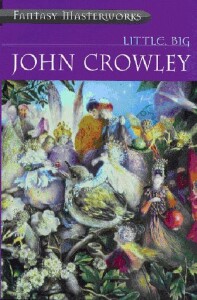Seán Harnett
Little, Big, first published in 1981 and winner of that year’s World Fantasy Award, has recently been re-issued by Orbit as part of its Fantasy Masterworks series. It’s both a welcome decision (the book has been out-of-print for ages) and a brave one: outside a small cabal of devoted fans Little, Big does not have a place in the consciousness of genre readers in the same way as, say, Moorcock’s Elric series or Wolfe’s Book of the Long Sun, nor is it an obviously genre-defining book, like Eddison’s The Worm Ouroboros or Dunsany’s The King of Elfland’s Daughter (all of which are also included in the series). Yet Little, Big is regularly cited by writers of fantasy fiction as the most influential book of the last twenty years. Crowley is – that wonderful phrase – a writer’s writer and the man who has done more to blur the boundaries between genre fiction and the literary mainstream that any other contemporary writer of fantasy.
It’s not hard to see why. Beautifully crafted and exquisitely written, Crowley’s novel is a multi-generational love story and family saga with more in common with One Hundred Years of Solitude and The Forsyte Saga than The Lord of the Rings. It tells the story of Smoky Barnable, a kind but unremarkable man from Manhattan and his marriage to Daily Alice, eldest daughter of John Storm Drinkwater and his wife, Sophie.
The Drinkwaters are a large bohemian clan living in upstate New York who wear their unconventionality lightly on their sleeves: they were, at one time, intimate with Yeats and have, moreover, made a Pact with Faerie. Actually, the pact was made by the family’s English ancestress, Violet Bramble, who moved to America at the turn of the century to marry the family patriarch, John Drinkwater; but the terms of the Pact, which are not revealed until the moving final section of the novel, extend down the generations. They threaten to undermine Smoky’s marriage to Alice, who believes (as do all her family) that Smoky was sent to her as part of the Pact. Smoky believes no such thing at all. He tells himself that Alice would have loved him and married him even if the Pact had forbid it.

The novel’s title refers to the belief (shared by all those party to the Pact) that the further you go into Faerie the bigger and more significant it gets, like the house in which the Drinkwaters live, Edgewood – which is not one house at all, the narrator insists, but many houses. More than one reviewer has noted what a dangerous tack this is for a novel to take, and it is true that Little, Big often threatens to tip over into tweeness with its coy symbolism and its arch allusiveness. The fact that it never succumbs is a testament to Crowley’s prose (sometimes reserved, sometimes wild and Dionysiac, at times elevated; always graceful: "the opiate of its beautiful prose" according to one early reviewer) and his conceits: the novel is a fairy-tale – or, at least, follows the protocols of what a fairy-tale should be – not because the author insists so, but because most of the characters understand themselves to be living inside a Tale – a Faerie Tale – and live their lives according to the logic demanded by such an article of faith.
Populated by a cast of eccentric, flawed but oddly likeable characters, Little, Big seems, at the last, to propose that the world we inhabit is a library of correspondences and coincidences, and that we all live archetypal existences. Nothing new here, then: western novelists have long mined Hermeticism and its contemporary lovechild, Jungian psychology, for material. Crowley is not the first novelist to suggest that we are all wise old kings and knight-errants in the fictions of our own, everyday lives (though he might be the first to point out that we choose more often to involve ourselves in interminable soap operas than heroic epics).
No, what is original and remarkable about Crowley is that he uses his wide occult reading, his deep sense of history and his symbolic fancies as the scaffolding upon which to hang a warm, human story, every bit as memorable and alchemical as the fictions of Gabriel Garcia Marquez. Yet, whereas the work of Marquez and his cohorts is shot through with a humid fatalism, Crowley’s work is informed by an autumnal, New England idealism.
